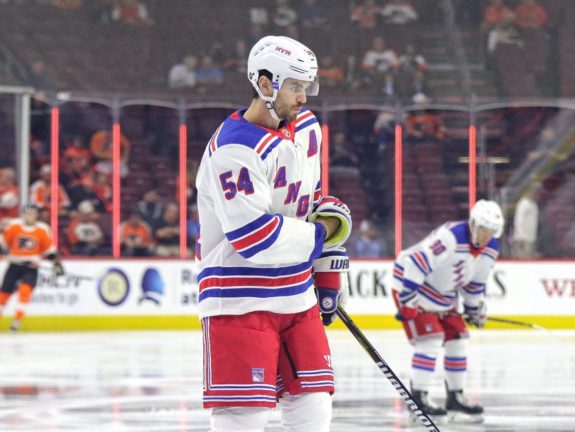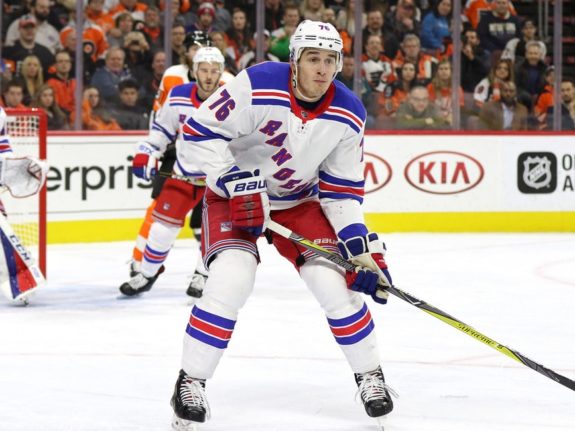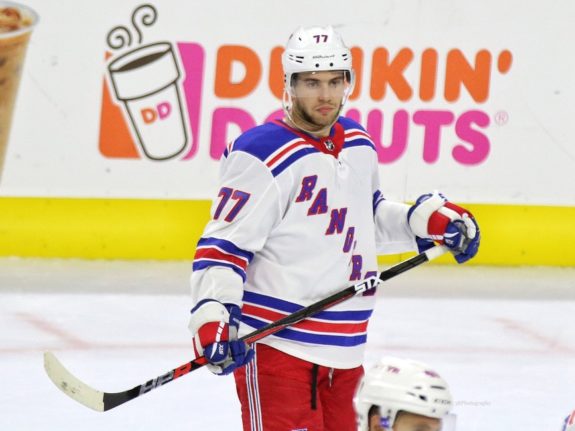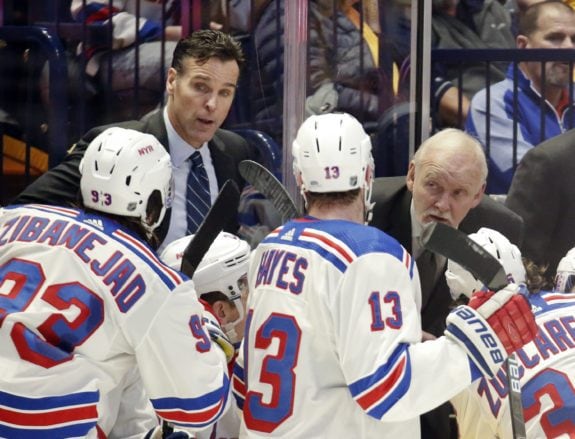With the second summer of their rebuild approaching, the New York Rangers are in the process of adding a glut of flashy new talent that’s looking to debut on Broadway next season.
Vitali Kravtsov. Kaapo Kakko/Jack Hughes. Adam Fox. Igor Shesterkin. Yegor Rykov. Maybe even Artemi Panarin or Erik Karlsson or Jacob Trouba?
Depending on how the offseason breaks, however, there’s a completely unflashy potential acquisition that could do wonders for the Blueshirts on the backline and in the dressing room.
That would be old friend Adam McQuaid, the blue-collar defenseman traded to the Columbus Blue Jackets at February’s deadline after just five months in a Blueshirt, a deal largely expected after McQuaid was acquired from the Boston Bruins last offseason.

Set to become an unrestricted free agent July 1, a reunion with McQuaid would make sense on many levels for the Rangers – and such an idea just might be on the radar of new team president John Davidson, who got to observe McQuaid up close with Columbus this season before leaving his post as Blue Jackets president to take the Rangers job last week.
McQuaid’s acquisition by the Jackets didn’t go as planned. Obtained for defenseman Julius Bergman and 2019 fourth- and seventh-round draft picks, he missed the final 15 games of the regular season due to a head injury and wasn’t able to play in the postseason.
McQuaid Played Critical Role for Skjei
If McQuaid proves to be healthy, however, the Rangers might be able to buy lower on a player who had injury issues of his own in New York but provided outsized value when he was on the ice.
McQuaid’s two goals, three assists and plus-three rating in 36 games with the Rangers hardly tells the story of his contributions. The 32-year-old veteran (33 in October) provided a badly needed presence for a young and often erratic defense, in particular Brady Skjei, the 25-year-old whose game stabilized after being paired on a consistent basis with McQuaid.
Skjei, who the Rangers are paying $5.25 million per year through 2023-24 despite two consecutive seasons of less-than-significant impact, confirmed that comfort level after teaming up with McQuaid.

“Adam and I have had good chemistry and I think we played well when we were together at the start of the year, ” Skjei said in December. “That’s not to say that Tony (DeAngelo) and I didn’t play well or couldn’t play well, but Adam brings a little different element to it. When I – or Tony – play with a more defensive-minded partner, there are fewer decisions to make about whether to go or stay back.
“Adam is one of the best defenders I’ve ever played with. He’s very steady and tough to play against.”
Those comments came after Skjei and McQuaid reunited following an October injury that kept McQuaid out for eight games, during which time the combination of Skjei and the offensively-minded DeAngelo didn’t work well. Before that, the Skjei-McQuaid pairing had been intact for 17 of the previous 21 contests.
Making a move to lift the game of Skjei, to whom the Rangers committed as a cornerstone by signing him to his six-year extension in July and who appears to be at a critical juncture with his confidence, would in itself justify exploring a second go-round with McQuaid. Yet the big guy played well overall and brought considerably more in his short Rangers tour.
The Blueshirts defense remains in need of McQuaid’s steadiness – and it needs depth. Along with the left-handed Skjei’s struggles, there’s the right side of the blue line, expected to be manned (at this point) by fading veteran Kevin Shattenkirk, the rookie Fox, the talented-but-immature DeAngelo and third-year player Neal Pionk. More nightly certainty is needed there, and the right-shooting McQuaid could again provide some level of comfort while Quinn and his staff work to solidify the defense.

McQuaid’s leadership and sense of commitment to his teammates, honed during his first nine seasons with the Bruins – during which time he won a Stanley Cup in 2011 – is also a perfect fit for a young, evolving group that needs the example set for it.
The 6-foot-4, 210-pound McQuaid also provided a desperately needed physical dimension in a Blueshirt, adding a nasty presence in his own zone and establishing that tone for his team when he was able to play. And though he engaged in only two fights with the Rangers, his feared skills as a pugilist and enforcer endure and would again be very welcome under coach David Quinn, who hasn’t been the least but shy about expressing his desire for a more edgy group as he heads into his second season behind the bench.
McQuaid Fits in Perfectly with Quinn’s Philosophy
Despite a dearth of physical players last season – and little in the way of that amid the talent influx for 2019-20 – Quinn still constantly impressed upon his team the need to play a harder, more straight-ahead game. At some point, his philosophy will have to be reconciled with the roster being constructed for him.
McQuaid can play a big role in helping Quinn further establish that more jagged identity for his club – an approach enthusiastically endorsed by the front office upon embarking on this rebuilding effort.
“He’s done a lot of great things,” Quinn said of McQuaid in February. “Him and Brady have really played well together. I think Brady Skjei has by far played his best hockey of this year. Obviously I wasn’t here his first two years, but boy, he’s defending hard, I think he’s making really good decisions with the puck. … I’m really happy for him and proud of the strides he’s made.
“I think Adam’s had something to do with that, but I also think one of the reasons Adam’s playing well is because he’s playing with Brady. I think they’ve both fed off each other.”

A McQuaid reunion would almost certainly be subject to any potential bigger moves made by general manager Jeff Gorton and the front office. If winger Panarin or right-side defensemen Karlsson or Trouba are coming, McQuaid probably isn’t. The Rangers’ salary cap situation is good but not great, with about $60 million committed for 2019-20 and DeAngelo, Pionk, Pavel Buchnevich, Brendan Lemieux and Fredrik Claesson restricted free agents whom the Rangers will likely look to retain.
More space can be opened by the possible trades of Jimmy Vesey, Vladislav Namestnikov and Ryan Strome, but those moves might be made with a major acquisition of Karlsson, Panarin or Trouba in mind.
Should the Rangers eschew/lose out on adding any of the Big Three, however, McQuaid would make a great deal of sense. His cap hit of $2.75 million last season could go up slightly in order to land him, but he’s unlikely to command more than a three-year contract at similar levels – with the emergence of a bigger offer that ends up being too rich for the Blueshirts always a possibility.
McQuaid’s Intangibles Could Again Add Big Value for Rangers
The Rangers would have to accept that McQuaid’s style will result in him missing more than a few games from time to time, as happened last season – but that factor could also make him more affordable. Signing him to a reasonable deal, preferably for two years, could prove to be tremendously shrewd and perfectly timed.
“He’s been a teammate for a long time,” Bruins forward Brad Marchand said upon learning about McQuaid being traded to the Rangers last September. “When you look around the room, you want guys like him. He’s an incredible guy off the ice, in the room, great friend.
“On the ice, he’s an incredible teammate and will do anything for the team and for each and every player. (Him being traded) sucks. Unfortunately, it’s part of the business. This is the game we play and these are things that happen, but we’ll never forget him as a teammate and friend. … It’s hard losing him.”
The Blueshirts experienced McQuaid’s impact for themselves last season, and a Broadway encore might be perfect for both sides. Four 2019-20 matchups with the heavy Washington Capitals await, and part of the mandate for this organization’s rebuilding project is to stop being pushed around on the ice.
McQuaid would of course excel in helping to achieve that, and his brand of toughness, leadership and professionalism are needed almost as badly as the elite young skill the Rangers are continuing to import. With a chance to lift the confidence and comfort level of not just Skjei but perhaps many of the other 20-somethings sure to dot the Rangers roster, Gorton would be remiss in not at least entertaining the possibility of McQuaid, Part 2 at Madison Square Garden next season.